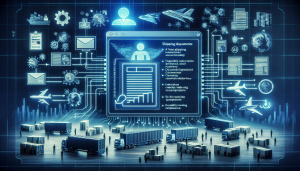 UseCasesFor.ai
UseCasesFor.ai
Choose Topic
 UseCasesFor.ai
UseCasesFor.ai
AI Use Cases
A collection of over 250 uses for artificial intelligence
A continually updated list exploring how different types of AI are used across various industries and AI disciplines,including generative AI use cases, banking AI use cases, AI use cases in healthcare, AI use cases in government, AI use cases in insurance, and more

Sign up
to receive a PDF containing all the use cases and stay updated with the latest AI trends and news (you can always unsubscribe)
Automated logistic documentation

Introduction
The logistics industry is evolving rapidly due to globalization and technological advancements. One transformative innovation is the use of AI, particularly in automating logistic documentation, which has traditionally faced challenges such as inefficiency and reliance on manual, paper-based processes. General AI, capable of reasoning and problem-solving, has shown promise in addressing these issues effectively. This article explores the integration of General AI in automating logistics documentation, addressing challenges, providing solutions, highlighting benefits, and evaluating the ROI through real-world examples. By reducing errors and streamlining processes, AI has the potential to revolutionize logistics, making operations more efficient and cost-effective.
Challenges
There are several issues that affect the logistics industry with regard to documentation. First, the number of documents required in the course of logistics operations can be vast and this creates a condition for mistakes and delays. Second, the issue of documentation processes varies from one region to another and from one company to another, such that there are no standard procedures to be followed. Third, this makes it difficult to achieve real time monitoring and control of goods due to conventional and tedious documentation processes. Fourth, the risk of fraud as well as security threats is quite evident since such information is considered to be very sensitive. Last but not the least, the problem of environmental degradation due to paper based processes is also a concern that is being addressed by the industry.
AI Solutions
There are currently a number of applications that are referred to as General AI that are being utilized in order to acquire, analyze and improve the logistic documentation. By using AI, documents can be created, checked and organized efficiently and effectively. Some of the benefits of using AI include the ability of the algorithms to learn from previous data that has been collected in order to make predictions on future occurrences such as documentation errors. Also, AI can improve security by detecting the deviation from the norm and the indications of tampering. Last but not the least, through the digitisation of documentation processes AI also helps in conservation of environment. Some of the well known AI solutions in this area are IBM’s Watson, Google’s Cloud Vision AI and Microsoft’s Azure AI which provide features like Natural Language Processing, Machine Learning, Optical Character Recognition for documentation related tasks.
Benefits
There are numerous advantages of applying Gen AI in logistic documentation. First, it enhances efficiency through streamlining routine processes and thus allowing employees to focus on more important tasks. Second, it decreases errors and thus increases the quality and credibility of the documents. Third, it improves transparency and traceability as it provides real time information on the location of the goods. Fourth, it strengthens security and the chances of fraud and data theft are minimized. Fifth, it is eco-friendly as it helps in reducing the use of papers. Last but not the least, it can be cost effective in the long run as it reduces labour costs and also does not lead to losses that may occur due to mistakes or fraud.
Return on Investment
The ROI of applying Gen AI in logistic documentation can be quite impressive even though it is not always quantifiable. Integrating AI solutions may be expensive at the initial level, but the benefits that include cost efficiency, increased efficiency, reduced errors and improved security may be seen in the long run. According to McKinsey, the first movers who have implemented AI in logistics have been able to cut down their operational costs by 15%, generate 25% additional revenue and reduce cases of fraud by 10%. Other big companies such as Amazon and Alibaba have also seen great ROIs on their investments in AI especially in logistics.